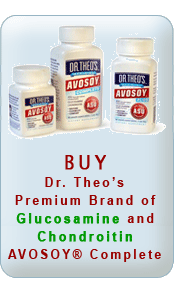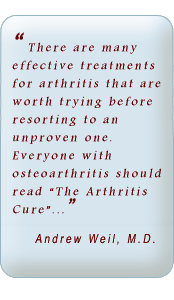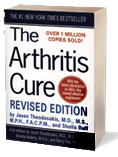Medical Evidence
Protective Effect of Exogenous Chondroitin
4,6-Sulfate in The Acute Degradation of Articular Cartilage in
the Rabbit Daniel Uebelhart, Eugene J-M. A. Thonar,
Jinwen Zhang And James M. Williams Department of Clinical Neurosciences
and Dermatology, Division of Physical Medicine and Rehabilitation,
University Hospital of Geneva, Switzerland; Department of Biochemistry
& WHO Collaborating Center for the Field of Osteoarthritis, Rush-Presbyterian-St.
Luke's Medical Center, Chicago, IL, U.S.A.
Summary: The injection of
2.0 mg chymopapain into the adolescent rabbit knee causes severe
loss of articular cartilage proteoglycans (PG). Although chondrocytes
attempt to restore lost PG, failure to repair ensues. Pure chondroitin
4,6-sulfate (Condrosulf®, IBSA Lugano, Switzerland) has been used
in clinical studies of human osteoarthritis (OA) as a slow-acting
drug for OA (SYSADOA). Using our model of articular cartilage
injury, we examined the effects of oral and intramuscular administration
of Condrosulf® after chymopapain-induced cartilage injury. In
this study, animals received an injection of 2.0 mg chymopapain
(Chymodiactin®, Boots Pharmaceuticals) into the left knee and
were sacrificed after 84 days. The contralateral right knee served
as a noninjected control. Some animals received oral Condrosulf®
while others received intramuscular injections of Condrosulf®.
Serum keratan sulfate (KS) levels were monitored to ensure degradation
of the cartilage PG. Those animals not exhibiting at least a 100%
increase of serum KS following chymopapain injection were excluded
from the study. At sacrifice, cartilage PG contents were markedly
reduced in animals receiving an injection of 2.0 mg chymopapain
with no further treatment. In contrast, oral administration of
Condrosulf® beginning 11 days prior to chymopapain injury resulted
in significantly higher (P=0.0036) cartilage PG contents. Intramuscular
administration of Condrosulf® resulted in higher, but less significantly
so (P=0.0457), cartilage PG contents.
Results: These
results suggest that daily Condrosulf® treatment prior to and
continuing after chymopapain injury may have a protective effect
on the damaged cartilage, allowing it to continue to re-synthesize
matrix PG after the treatment is discontinued.
Source: Osteoarthritis and
Cartilage (1998) 6, (Supplement A), 6-13 C 1998 Osteoarthritis
Research Society
Dr. Theo’s Comments: This
animal study shows that injected chondroitin sulfate can help
increase the production of cartilage components from cartilage
cells after the joints were damaged using chymopapain. This study
tries to delineate the mechanism of how chondroitin benefits the
joints.




